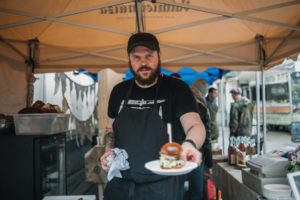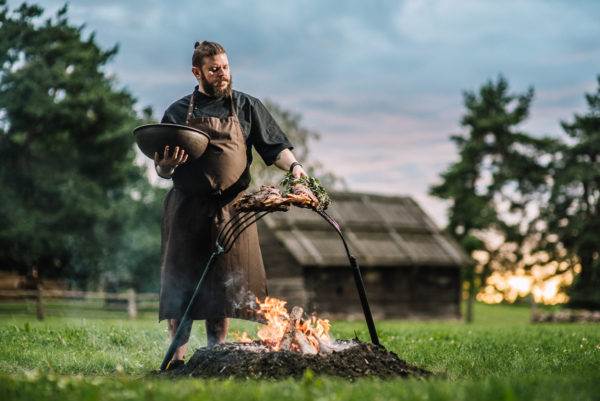 I always begin my chef interviews with the question: Our tastes in food are closely connected to our childhood; what are your first memories of food?
I always begin my chef interviews with the question: Our tastes in food are closely connected to our childhood; what are your first memories of food?
I completely agree with that. As I think back – we lived in a forest and the nearest store was something like 4.5 miles away. My grandfather used to go there once a week to get some cheap bread-based cattle feed (called ‘’the brick’’ in Russian) and he always brought home some warm, fresh cottage cheese pies.
Your surname sounds Greek or Polish, can you explain?
It’s Polish. My grandparents on father’s side were from Poland and Belorussia. My mother was born in Karelia (the region of Russia near Finland); my father is the only family member (before me) born in Latvia.
I’ve read that you weren’t always a chef, that you didn’t go to hotel school, that you had other professions and then cooked in fast food restaurants. Is that correct?
Yes, I studied languages and the translation of technical literature. After that I went to work in a kebab shop.
Why did you choose to become a chef?
I didn’t choose to; it was something to do, something that I got paid for. Later it grew into curiosity and after that into passion. Now it’s a lifestyle.
Are there any other professional chefs in your family?
Not that I know of. In the Baltics being a chef was never considered prestigious, of high social status. However, I want to add – everyone can cook, but not everyone can be a chef.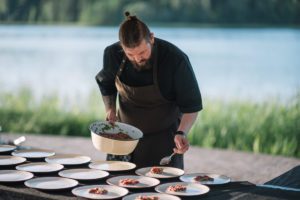
Who were your mentors and what did you learn from each of them?
I have no mentors; I’m all DIY, “Do-It-Yourself” or Self-Taught.
A brief summary of your career?
Lots of kebabs; some frozen fish in Norway; some woks, some pasta and other wannabe Italian mumbo jumbo; some more pasta (at that time it was the trend, not that anyone had a clue how to cook it – they just did); more frozen fish in Norway again. And then I came back to Latvia, somehow got into Valmiermuiža where I really started cooking (and thinking), not just hibernating in the kitchen.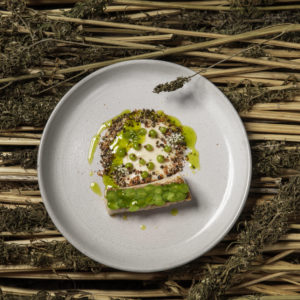
How did you go from cooking fast food to haute cuisine?
I evolved. Anyone can do that.
You are Ambassador of the Riga-Gauja 2017 European Region of Gastronomy; what does that mean; what are your duties?
There are no obligations. But! I’m happy to be in this position and happy to be Latvian (I’m not proud though; there’s already too much pride in the world). I want people to get to know Latvia, come to Valmiermuiža, say hello and (maybe) stay a little longer in Latvia.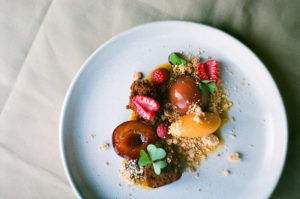
“Live Riga” told me that you come from this region and that is why you came out here. Do you think that foreign tourists will leave Riga to come here?
“Live Riga” has it all backwards. I’m from Kurzeme. It’s a different part of the country. If everybody moves to the countryside, Riga will be left with fake pizza and Chinese bistros… so… they’ll have to come to the less known parts of this country.
Other Latvian chefs you admire?
None yet! Well, I respect them all, but..
Non-Latvian chefs you admire?
I admire everyone who voices his or her opinion… and I’m willing to change things for the better without any financial reward.
What are the essential qualities of a top chef?
Taste, esthetics, guiding others.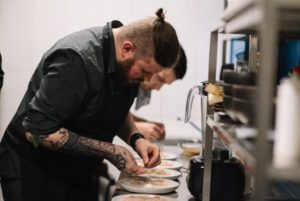
What do you like best about your work?
Free food…and the adrenalin during service.
The least?
Rude and ignorant (in all senses of the word) guests.
What’s your culinary philosophy?
Every time I visit my parents during the summer, my mother always goes to the garden, gets some lettuce, herbs, and summer veg and then makes a salad and some fried pork. Often she gets some jam from the cellar and makes some pancakes. To me these simple things, like homemade food, are of great value; because you can’t get them anywhere else in the world and you can’t buy them. I base my cooking on the same simple ingredients, those humble vegetables that grow right here, and local meat from local farmers and hunters.
In a nutshell, how would you define your cuisine?
Simple.
Am I right that you believe your cuisine is a reinterpretation of dishes from everywhere using Latvian ingredients?
That’s not correct. I do use some of the classic methods, but I don’t do variations or spins on classic recipes. There’s a huge difference between a method and a recipe.
Your opinion of restaurant guides?
It’s nice to be featured, but that’s not my goal and shouldn’t be for other chefs. Taste is subjective and therefore so is ranking.
Many chefs aspire to being awarded Michelin stars, what about you?
I would be lying, if I said ‘’no’’.
What are your signature dish and other specialties?
Potato ‘’risotto’’ and cooking with beer.
Up to now you’ve told me about Dzintars Kristovskis the chef; I’d like to know more about Dzintars Kristovskis himself. For example, what are your favorite foods?
I like lots of different foods, but nothing beats my mother’s beetroot soup.
A Latvian dish you always ask your mother to make for your birthday?
There are no Latvian dishes. This country is a melting pot and its cuisine has been influenced by the cuisines of all the countries that have invaded and occupied it throughout history.
But… I would probably ask my mother to bake me a cake even if dozens of other countries make cakes with similar recipes.
A dish you dislike?
None.
I presume your favorite drink is beer; right?
It was. I haven’t drunk alcohol for the past five years.
Your favorite herbs and spices?
All chefs change their herb and spice preferences. Right now my favorite herb is tarragon. I call it my tarragon stage.
How did you get the nickname “Amber”?
It’s not a nickname. That’s what my name actually means.
What is never missing from your refrigerator at home?
My wife does all the cooking at home. But probably some kind of cheese is always in our refrigerator.
Your favorite ingredients to work with?
All of them.
What are your hobbies?
I used to play the base guitar. But now this job takes up all of my time.
Where do you like to go on vacation?
Any remote place. I don’t like huge masses of people.
If you hadn’t become a chef, what other profession would you have chosen?
A millionaire.
Do you have a pipe dream?
To run a small restaurant of my own, grow my own food.
